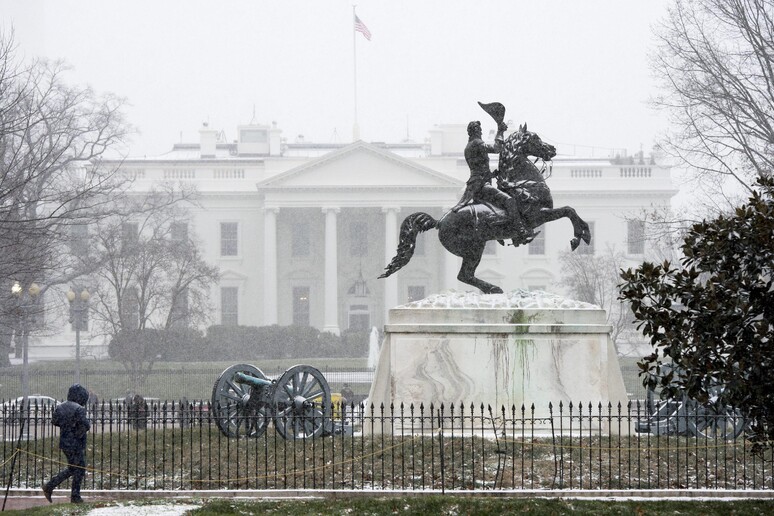The edicts issued by “Tsar Donald” from the White House underscore his assault on the functions of the federal administration. After targeting the Justice Department by firing investigators who probed his legal affairs, and dismissing independent federal watchdogs overseeing 17 agencies for waste, fraud, and abuse, Trump has now frozen federal funding for vital programs. This move directly impacts aid for vulnerable populations, education in struggling areas, and nonprofit organizations.
Budget Director Matthew Vaeth explained to CNN that the suspension will not affect Social Security pensions or Medicare healthcare assistance. The directive calls on federal agencies to identify and “review all financial assistance programs and support activities consistent with the president’s policies and requirements,” with a specific focus on eliminating funding for “Marxist social engineering policies, DEI (Diversity, Equity, Inclusion), and the Green New Deal.”
The order has plunged local mayors, school principals, hospital directors, nonprofit organizations, and research firms into uncertainty as they scramble to assess the directive’s scope and the speed at which federally funded activities might be forced to halt. Programs like Head Start, school meal plans, Medicaid (healthcare for low-income individuals), and Meals on Wheels (food assistance for seniors unable to shop or cook) are among those at risk. Funding from the Inflation Reduction Act and the 2021 Bipartisan Infrastructure Law is also in jeopardy.
The executive order includes provisions to terminate the “Green New Deal,” freezing hundreds of billions of dollars allocated to infrastructure projects initiated under former President Joe Biden. These grants, already approved by Congress, were key elements of the Inflation Reduction Act (IRA) and the Bipartisan Infrastructure Law.
While the White House has framed the measure as a temporary freeze, it has created chaos and uncertainty across broad swathes of the federal government. Observers see this as another move by Trump to appeal to his sympathetic Supreme Court to expand presidential powers by withholding funds already appropriated by Congress. This tactic, banned by law following President Richard Nixon’s attempts to dismantle Johnson-era integration programs, raises significant legal and constitutional questions.
This imperial view of executive authority undermines the foundational principle of American democracy: the separation of powers.
What happens to the judiciary when a president accused of breaking the law can fire the officials investigating him? How can independent oversight function when watchdogs are replaced by loyalists to the president? Will oversight focus solely on the misdeeds of political opponents? And what of private-sector partners, enlisted under the previous administration to drive infrastructure transformations, now seeing their projects derailed?
These executive orders aim to expand presidential authority at the expense of the legislative branch, which had approved the funding in question. Democratic Representative Rosa DeLauro, a leading member of the House Appropriations Committee, called the executive order “illegal” and described the freezing of federal funds as “theft, because Congress approved these appropriations. An executive order cannot override the law.”
During his confirmation hearing last week, incoming OMB Director Russell Vought—one of the architects of Project 2025—refused to say whether he would allow Trump to violate the 1974 Impoundment Control Act, which prevents presidents from withholding federally appropriated funds without congressional consent. He declined to answer senators’ questions about his response should Trump defy the law.
Bobby Kogan, who worked in the White House budget office under the Biden administration, described Trump’s decision as “illegal,” violating laws that prohibit presidents from unilaterally withholding funds already approved by Congress. “This is the worst-case scenario we feared,” said Kogan, who also served as a Democratic aide on the Senate Budget Committee and now directs the Center for American Progress.
In a statement, Senate Minority Leader Chuck Schumer accused the Trump administration of “blatantly defying the law by blocking critical funding that supports basic aid programs in every community across the country.” Schumer emphasized that Congress had passed these investments as mandatory under federal law. “These grants are essential for the nation’s development, families, communities, and schools, benefiting millions of Americans.”
Schumer also noted that several Democratic-led states are preparing lawsuits to challenge the White House’s latest decision. Speaking to reporters, he said that New York Attorney General Letitia James has been tasked with filing a case in the Southern District of New York federal court. “My office,” James wrote in a statement, “will take immediate legal action against this unconstitutional federal funding freeze. We will not stand by while this administration harms our families.”
Joining New York in the lawsuit are California, Illinois, New Jersey, Massachusetts, and Rhode Island.











